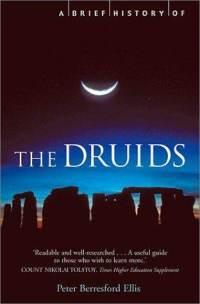
I know I’ve talked about this book before. I had cause to learn about the Druids again, and Peter Berresford Ellis’ book was handy. I’m pretty sure I have Stuart Piggot’s book somewhere, but I haven’t seen it since the move, so I turned to Ellis again. The first time I read him I was commuting and couldn’t take notes. (My specialized form of research has its limitations.) This time it took several days’ more reading, and doing so with more active engagement. One thing that really stood out to me this time was the Indo-European connection. Druids, according to Ellis, were essentially Brahmins—the intellectual class in a stratified society. Having derived from a common ancestor, the two societies diverged with Brahmins surviving in India and Druids going extinct with the somewhat genocidal treatment of various other groups against the Celts.
Druids were egalitarian as far as the sexes went. This is one of those examples where Christianity’s masculinist orientation furthered a trend that led to women being treated as inferior. Evidence points to early female Druids, and even female political leadership among the Celts. As the male godhead took over the remaining influence of women eventually evaporated. The Druids, you see, were extremely focused on learning the truth. Their pre-Christian judicial system was oriented toward fairness and finding out what really happened. In other words, ethically they required no conversion. That was a matter of theology, and theology often brings its own set of issues.
The Romans, who’d had a long and protracted war against the Celts, drove them to the fringes of their empire. Britain (and Brittany in France) were far enough removed from the base of power in Rome that the Celts survived in the edges of the islands: Cornwall, Wales, Scotland, the Isle of Man, and Ireland. As a distinctive culture, Celts have been in fashion for some time now, but that’s a new development, historically speaking. Ellis’ book explores this angle quite a bit since understanding the Celts is essential to comprehending who the Druids were. The lack of native written accounts (Druids forbade writing their wisdom, passing it on by memorization over the centuries) hampers our ability to have a coherent history. Ellis, however, seems to have reconstructed well. Modern Druid revivals necessarily contain speculative elements, and historically the Druids wouldn’t have been perfect either—nobody is. They do seem to have had a reasonable and just society for the most part, something we’ve managed to lose, along with much of their wisdom.
